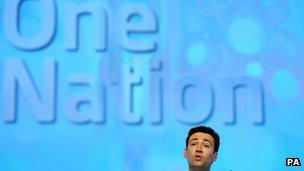One nation Labour: what does it mean for policy?
- Published

Labour's frontbenchers have yet to spell out what the new slogan will mean in practice
I noted yesterday that it is a banner to march under, a tune to hum and a new brand to replace New Labour.
But what does One Nation Labour amount to?
In policy terms, it is quite simply too early to tell. Ed Miliband has decided that with two more party conferences to go before the next election and the course of the economic crisis utterly unpredictable it doesn't make sense yet to fix on, let alone unveil, specific policies.
We did, however, get a clear sense of direction.
The Labour leader wants his party to be seen as different from New Labour in important ways - no longer "intensely relaxed" about inequality and the very rich; no longer content to redistribute the fruits of the market but keen to re-write the rules; no longer focussing its message on the upwardly mobile aspirations of swing voters but addressing their anxieties instead.
In conventional terms this is about being more left wing than Tony Blair - keener on taxes and regulation whilst more hostile to the private sector - whether G4S or private rail companies or firms like Virgin Healthcare which grew thanks to the NHS reforms of the last Labour government.
Ed Miliband would, I suspect, dispute this labelling - arguing that he is not moving the party to the left so much as reflecting the fact that the centre ground of British politics has moved in response to the failures of the banks and the private sector to act in the public interest.
Yet, in another way One Nation Labour is a deeply conservative label and is meant to be.
It brings together the political holy trinity of faith, flag and family and draws its inspiration from Labour's success after the second world war.
Ed spoke not as other leaders have of their values, beliefs or, even, ideology but his "faith." The Union Jack, once shunned as a symbol of nationalists or extremists, was everywhere to be seen in Manchester.
The announcements were meant to reassure older voters that their children or grandchildren could get the education, the apprenticeship or the home that they had once taken for granted.
Brother David has noted that Labour lost four million English voters and 137 English MPs between 1997 and 2010.
The party has only two MPs in the East of England and only four in the South East, excluding London, compared with 44 in the North West where the conference was just held.
One Nation Labour is a project designed to win those voters back in those non Labour areas.